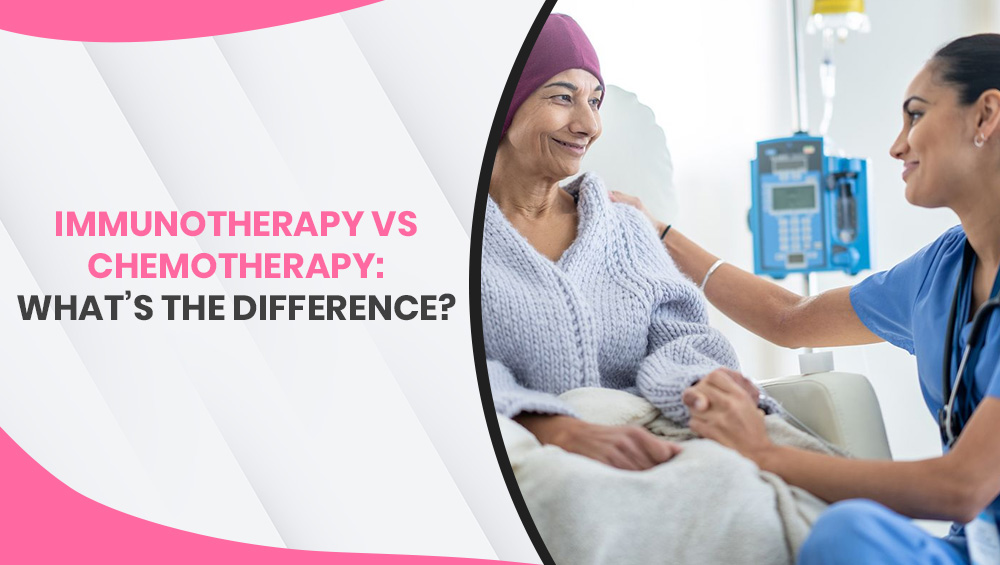The first question you might ask if you have been diagnosed with cancer is what type of treatment is available. One thing you will probably hear about is chemotherapy and immunotherapy, both of which you will come in contact with. Although it may be difficult to grasp the differences between the two, at first, both therapies are widely recognized by cancer professionals. However they provide very different treatment options.
In this blog, we will discuss the basics of immunotherapy vs chemotherapy, which will provide you with a better understanding of these treatment options and feel more certain when discussing treatment options with your doctor.
What is Chemotherapy?
Chemotherapy is one of the oldest cancer treatments that continues to be used today. This is done by giving some very powerful medicine to kill off all the cancer cells. Since it is delivered through the bloodstream, it can attack cancer cells anywhere in the body.
How it works: It works by targeting all rapidly dividing cells. It includes cancer cells as well as healthy cells in hair follicles, bone marrow, and the digestive tract.
Side effects: Hair loss, nausea, fatigue, lowered immunity, and loss of appetite are some common side effects because healthy cells are also affected.
What is Immunotherapy?
It is a new plus better option of treatment for cancer patients. It not only kills the tumor cells, rather it also helps the immune system to find and kill tumor cells.
How it works: It uses medicines such as checkpoint inhibitors, monoclonal antibodies, or CAR T-cell therapy that boost the body's own defenses.
Benefits: It targets cancer more in detail, and generally has fewer side effects than chemotherapy (and perhaps none).
Side effects: You may get symptoms like flu, fatigue, or inflammation. Side effects are generally less than chemotherapy.
Immunotherapy vs. Chemotherapy: Key Differences
Can Immunotherapy Cure Stage 4 Cancer?
The success of treatment depends on the type of cancer and genetic factors and overall health of the patient. While stage 4 cancer is often challenging, immunotherapy has shown remarkable results in certain cancers like lung cancer along with melanoma and kidney cancer as in some patients immunotherapy has led to long-term remission and improved survival rates.
When Is Chemotherapy Preferred Over Immunotherapy?
While immunotherapy is being improved upon we often still regard chemotherapy as the option for treating disease. Some examples are:
-
When cancer is especially aggressive and requires immediate intervention.
-
When the tumor type of cancer does not respond particularly well to immunotherapy.
-
When patients have autoimmune conditions that may worsen with immunotherapy.
When Is Immunotherapy More Effective?
Immunotherapy can be more effective than chemotherapy in cases such as:
-
Melanoma and certain lung cancers as well as kidney cancers.
-
Patients who are unable to tolerate the severe side effects of chemotherapy.
-
Advanced or recurrent cancers for which chemotherapy has not worked.
Combination of Chemotherapy and Immunotherapy
Sometimes doctors use both therapies together. This approach can:
-
The tumor will shrink quickly when you use chemotherapy.
-
Develop the immune system through immunotherapy to avoid repetition.
-
Increase the odds of survival overall for cancers that are advanced.
Chemotherapy vs Immunotherapy: Which is Right for You?
Choosing between chemotherapy and immunotherapy is not always easy as in many cases oncologists use both together for better results. The right treatment plan depends on:
-
Type and stage of cancer
-
Patient’s overall health and medical history
-
Availability of advanced treatment options at hospitals
-
Guidance from a trusted oncologist
Final Thoughts
For many years, chemotherapy has been the most common form of treatment. Immunotherapy could be a possible alternative for advanced cancer patients. Understanding the distinction between immunotherapy and chemotherapy will help patients make informed decisions in the treatment process.
If you or someone close to you is considering treatment options then talk to the Doctor. Dr. Pooja Babbar is the best oncologist in Gurgaon, holds more than 15 years of experience and she treats patients with advanced 4th stage cancer. Her expertise is in chemotherapy which targets hundreds of therapy or immunotherapy as they receive individualized treatment plans tailored to their specific condition














